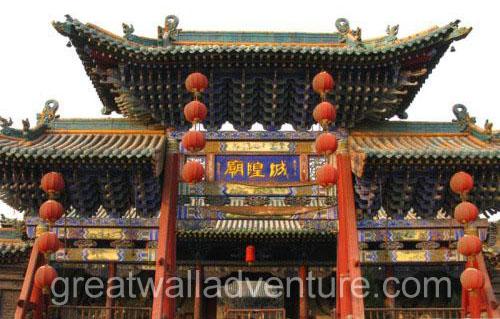|
|
Pingyao Tour of
Temple of the City God
|
|
As one of the best preserved temples in China, the
Temple of the City God is located in the southeast of Pingyao City.
The whole construction is of a grand scale, and covers an area of
7,302 square meters (approx. 8,733 square yards). The temple has a
long history and has been renovated several times.
Built facing the south, the temple looks very
magnificent. The wonderful woodcarvings, stone sculptures, painted
sculptures and mural paintings in it reflect excellent
craftsmanship. The two murals in the temple are art treasures that
are rarely seen in China. The beautiful colored glaze decoration
forms a feature of particular interest in the temple. The roofs in
the temple are adorned with the colored glaze with the predominant
colors of blue and green, all appearing very special and beautiful.
The whole temple is composed of Temple of the City God,
Caishen (god in charge of fortune in Chinese legends) Temple, and
Zaojun (god in charge of food) Temple.
Temple of the City God: It includes many constructions
such as Hall of the City God, Theatre Hall, and Sleep Hall. Hall of
the City God is the court of law of the city god, thus the
atmosphere in the hall is serious and gloomy. The city god is
sitting upright in the shrine with the judges and ghosts standing to
the side. Sleep Hall is the place where the city god lives with
family dependants. The room downstairs is the site where the city
god deals with special legal cases and receives guests, while the
room upstairs is the city god's bedroom.
Caishen Temple: Three main figures are in the shrine to
be worshipped. The sculptures in the shrine are delicately carved
and symbolize delight and auspiciousness. The painting on the wall
vividly depicts the great occasion of minority's coming a long way
to present tribute to emperor. Besides Caishen Temple, there are
also Zhenwu Pavilion and the Theatre Hall of Caishen.
Zaojun Temple: Cooking god is one of the most
respectable and reliable gods in Chinese people's mind. Legend says
that the cooking god is dispatched to supervise people's acts
indoors and report the fruit of his work to the highest god every
twelfth month of the lunar year. In order to avoid bad deeds being
reported, people prepare a kind of delicious dessert for the cooking
god named 'Tanggua'. In the temple, when spring comes, the
100-year-old clove trees bloom and give off perfume, adding vitality
to the temple.
The temple is deeply rooted in the religious culture
and well reflected in the folk customs. It is a special site that
tourists should never miss when visiting Shanxi.
Tour Pingyao
with Great Wall Adventure Club, the best Pingyao
tour agent to help
you with your hotel booking and transfers.
|
|

